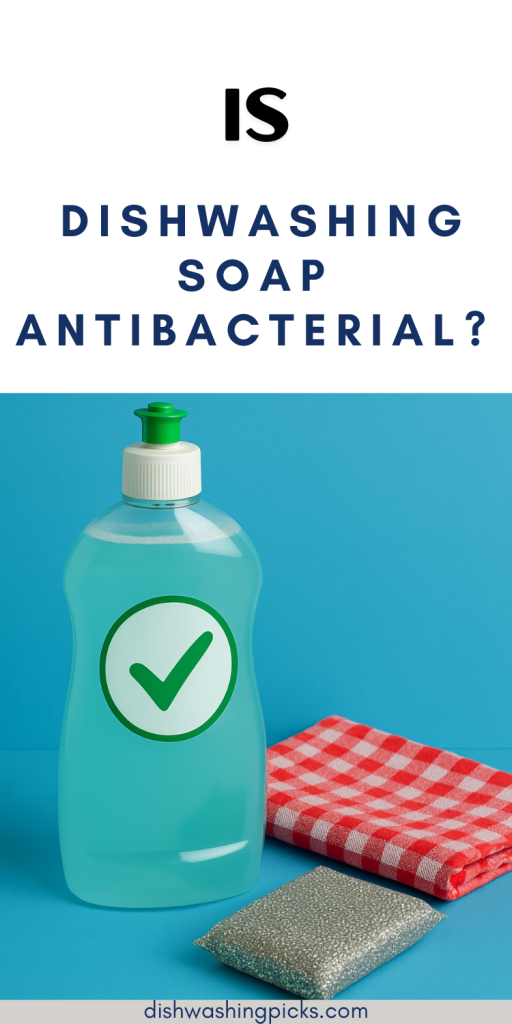
Let’s Talk Suds… and Germs
So you’re standing at your kitchen sink, sponge in one hand, bottle of dish soap in the other, and this random thought hits you:
“Wait… does this soap actually kill bacteria? Or am I just giving my dishes a bubble bath for fun?”
It’s a fair question. Because we’re all trying to keep things clean—like really clean—and if your dish soap isn’t actually doing the whole antibacterial thing, what’s the point, right?
Let’s break this down, nice and simple, and clear up what dish soap can (and can’t) do when it comes to germs.
First Off: What Even Is Antibacterial Soap?
Before we start tossing around the word “antibacterial” like it’s glitter, let’s define it.
👉 Antibacterial soap is specifically formulated to kill or inhibit the growth of bacteria. It usually contains extra ingredients—like triclosan or benzalkonium chloride (yeah, try saying that three times fast)—designed to attack bacteria at a molecular level.
But here’s the thing: not all soaps go that extra mile. Some just clean by lifting away dirt, grease, and germs—not necessarily killing them on contact.
Which brings us to…
Is Regular Dish Soap Antibacterial?
Okay, let’s cut to it:
Most regular dish soaps are NOT technically antibacterial.
If you flip over your average bottle of dish soap—think Dawn, Palmolive, whatever’s under your sink—it probably doesn’t say anything about killing bacteria. That’s your clue.
But here’s the twist…
Even though it’s not “antibacterial,” it’s still very effective at removing bacteria.
Wait, what?
Yep—dish soap works by breaking up grease and grime and physically lifting bacteria off surfaces so they can be rinsed down the drain. It’s like a bouncer at a club: doesn’t need to kill you, just needs to get you out the door.
So, no, it’s not some germ-destroying superhero, but it does get the job done in a different (and still totally valid) way.
But There Are Antibacterial Dish Soaps, Right?
Absolutely! They’re just a bit more niche.
Some brands make antibacterial versions of their dish soaps. These are usually clearly labeled (they’ll scream it on the front of the bottle), and they do contain ingredients specifically meant to kill bacteria.
For example:
- Dawn Ultra Antibacterial
- Palmolive Antibacterial Dish Liquid
These types of soaps are great if you’re especially germ-conscious, dealing with raw meat juices, or just want a little extra peace of mind.
But here’s the catch:
The “antibacterial” claim usually applies more to your hands than your dishes. These soaps double as hand soap and are tested for reducing bacteria on skin—not necessarily your plates.
So if you’re hoping your dish soap will turn your sink into a bacteria-free zone… well, it’s kind of doing that, just not in the way you probably imagined.
So… Should You Be Worried About Bacteria on Your Dishes?
Honestly? Probably not.
As long as you’re:
- Washing your dishes with warm water
- Using a decent dish soap (antibacterial or not)
- Giving everything a good scrub
- And rinsing thoroughly
…then you’re good. Like, 99.9% good.
The mechanical action of scrubbing + soap + hot water is what really matters here. The soap helps loosen the bacteria. The scrubbing dislodges it. The water washes it away. Teamwork.
What If You’re Still a Bit of a Germaphobe?
No judgment. If you want to go above and beyond, here are a few ideas:
- Use the sanitize setting on your dishwasher (if you’ve got one)
- Disinfect your sponge regularly (microwave it wet for 1–2 minutes or swap it out weekly)
- Use separate sponges for meat stuff vs. everything else
- Let dishes air dry instead of using towels (less bacteria transfer)
And sure, grab that antibacterial dish soap if it gives you that “ahh, everything is safe now” feeling. Just remember—regular soap isn’t slacking. It’s just working quietly behind the scenes.
Final Thoughts: Soap’s Still Winning, Even If It’s Not “Antibacterial”
So no, not all dishwashing soap is antibacterial in the “kills on contact” kind of way. But does that mean it’s not doing its job?
Not at all.
Regular dish soap is still totally effective at getting your dishes clean—and clean means bacteria gone. So whether you’re using a citrus-scented classic or a super-charged antibacterial bottle, you’re still in good hands. (Literally.)
Bottom line? If it’s soapy, sudsy, and you’re not just waving the sponge around for fun, you’re doing it right.
Want a breakdown of the best antibacterial dish soaps on the market? Need a germ-busting kitchen checklist? Just let me know—I’ve got dish-duty hacks for days. 😄🧼🍽️
